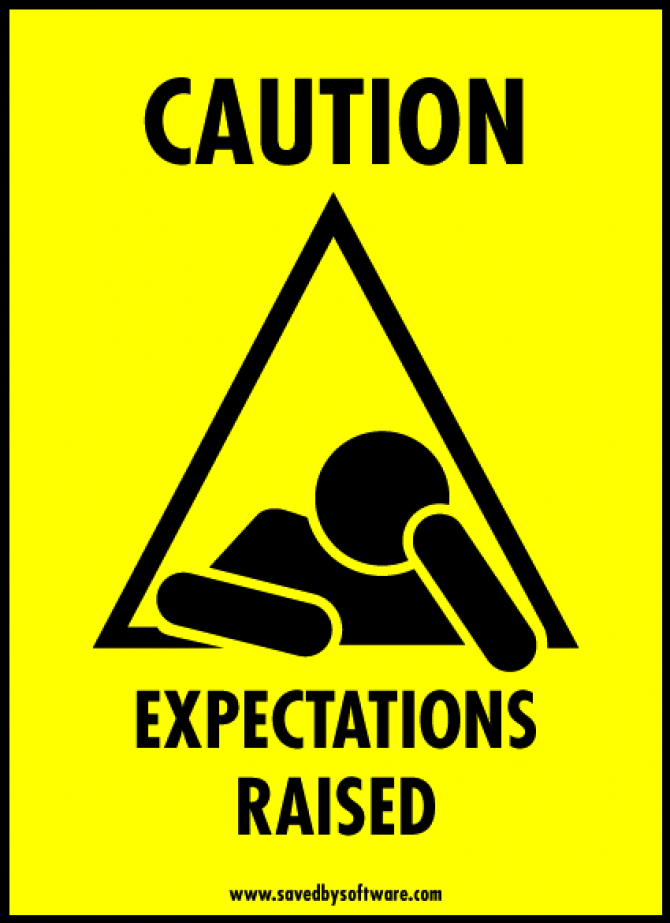Leadership Lessons My Kids Taught Me: People Try to Live Up to Your Expectations
Being a parent is an educational experience, as I’m sure those of you who’ve raised children can attest to. But as a lifelong student of business, and more specifically, management, I wouldn’t have thought that I would learn all the really important leadership lessons from my children.
I did, though. I met this week with a friend who hasn’t had children, and as we discussed leadership, I realized that my view on the subject has really been influenced by my experiences as a parent. Further, I realized that there are a few key lessons that really relate to Self-Management. So I’m going to try to write about them in my next few posts here.
This isn’t, for those of you who are feeling a little cynical, one of those shallow “I learned it in kindergarten” type articles. It’s a small set of leadership principles, the revelation of which I’ve only received as a result of my attempts to be an adequate parent.
So here goes.
Lesson #1: People Will Try to Live Up to Your Expectations
I guess it’s a little cliché, but hear me out before you deem this post shallow; I think you’ll be surprised.
I learned early on as a parent that setting an expectation for excellent things—grades, performance at the karate exhibition or piano recital, a singing part in the church Christmas event—caused my kids to strive to achieve that level of excellence. We talk a lot at our house about being excellent, and about what it takes to be excellent: discipline and hard work, focus, commitment, responsibility and a good attitude. And my children put a great deal of effort into meeting those expectations.
As I pondered their effort, I began to wonder what it would be like if, instead of talking about excellence we talked about mediocrity or “doing enough to scrape by”. Would their efforts and attitudes be different? They would, I think. Here’s why: an expectation is a somewhat overt message that says, in no uncertain terms, “here’s what I think you’re capable of”. That’s a pretty powerful thing to say to a kid: this is what I think you can do; it has an incredible effect on what they actually achieve.
And then there are the parents who constantly berate their children, pointing out their inadequacies, and using every failure on the part of the child as further proof that the child doesn’t have what it takes to be anything of any import. We’ve all seen those parents, and we’ve all met their children; often, the child perfectly achieves the parents’ expectation of him.
I don’t think this is a hard sell, is it? I’m not telling you anything you don’t agree with (at least most of you), to some degree. But if it’s good for a child, is it good for an adult too? Yet our businesses, by design, have this horrible tendency to set expectations depressingly low. There are locks on every thing we can possibly lock—implying we expect someone to steal. An employee has to get a requisition signed, in triplicate by four different managers, in order to purchase gloves and safety supplies—implying we think someone is wasting company resources. Employees have to go through an intricate and, frankly, oppressive systems of checks, and achieve myriad approvals before implementing any sort of meaningful change—implying that we think most of our people are dumb and can’t think through the change process.
I know that there are a few of you reading this—my “but I was a good manager”—friends who are already scrolling to the bottom to tell me why I’m wrong, and that’s OK; I’ll read the comment and likely respond. But before you do, ask yourself if I’m really all that wrong; don’t those things, even if they’re subtle, send some pretty powerful signals to employees about what we expect of them? And, if that’s the “here’s what we expect” message that we send, how likely is it that we’re going to have a strong population of employees in our enterprises who truly perform excellently?
I had a conversation recently with a colleague in one of our affiliate enterprises that really brought this idea into focus for me. This colleague was remarking on the general inadequacy of the colleagues they work with on a regular basis. The people they work with, this colleague said, were lazy, liars who have a tendency to steal. I was a little surprised by this, but listened as the colleague went on to outline the things they had worked to implement in an effort to catch the liars, thieves and sluggards. I wondered if those efforts had resulted in a more honest group of non-thieving colleagues with incredible work ethics? The answer was no. It made me wonder which was the cause and which was the effect.
So here’s my point: Self-Management is built on a foundation that expects quite a lot out of people. There aren’t a lot of locks, because there’s an expectation that people will be brutally honest; there aren’t a lot of hoops to jump through in order to cause change, because people are expected to be the experts who know what change is needed; and people don’t have to get “approvals” to make purchases, because they’re expected to know better than anyone what needs to be purchased in order to perform.
Of course that raises some, “but what happens when…” questions, which we’ll endeavor to answer in subsequent posts!
– Originally published by The Self-Management Institute on December 24, 2010.




